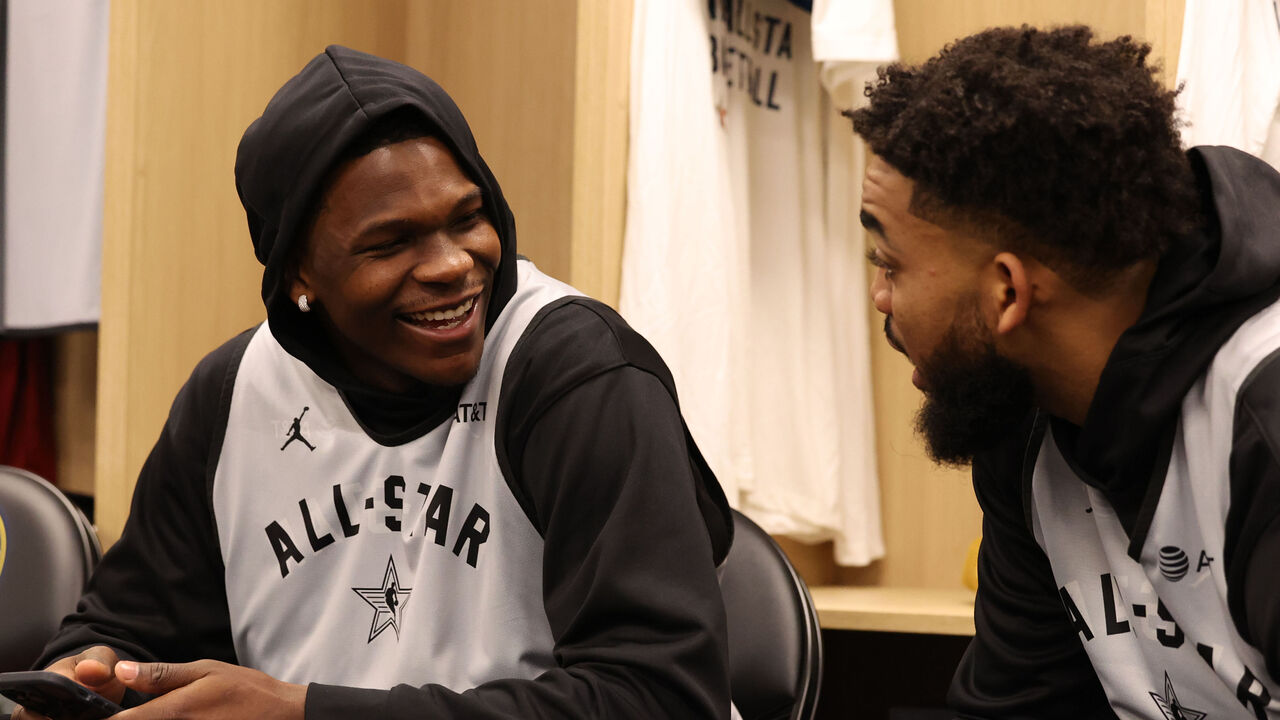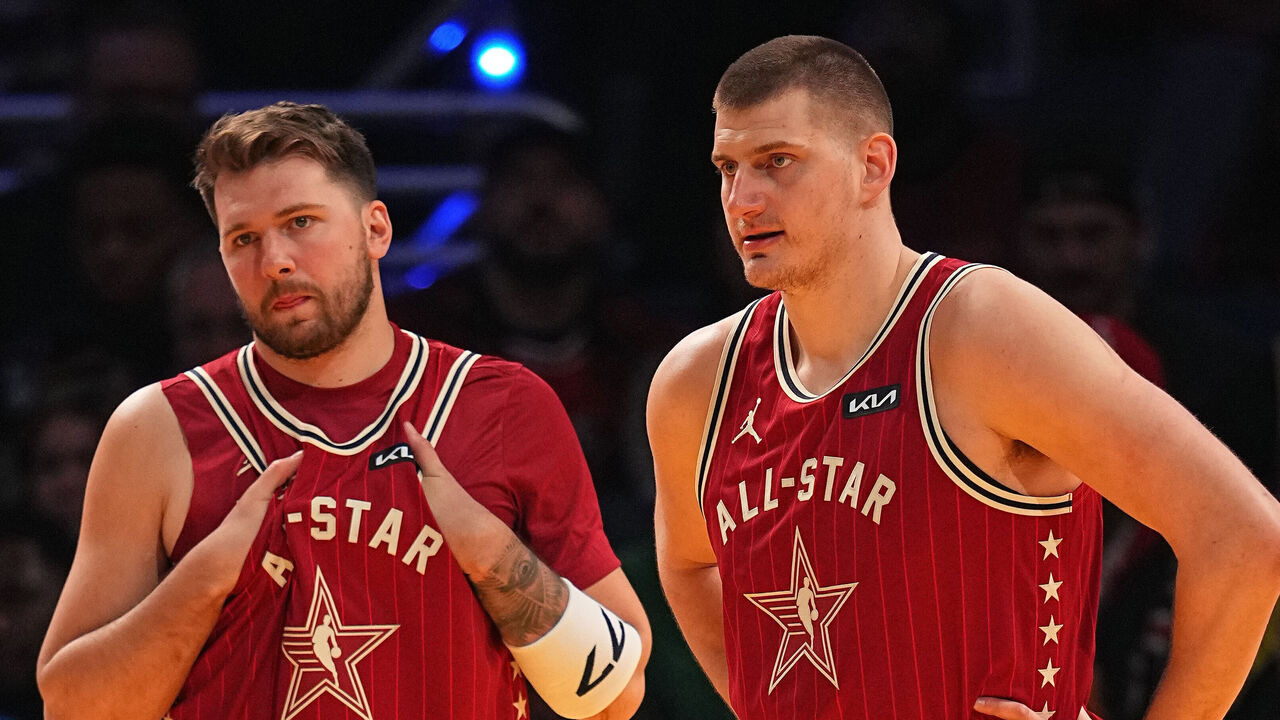No All-Star tweak can change the fact players don't care anymore
After staging another listless All-Star Game, the NBA's burning question this week centered around how the league can fix its midseason showcase.
Whether the All-Star Game needs fixing at all is a question in itself. Television ratings were up 20% compared to last year's record-low, with the NBA claiming record engagement across social media and digital platforms. Further, the issue of competitive integrity in All-Star exhibitions is rarely of concern among North America's other big four sports leagues.
But as long as commissioner Adam Silver and the league office keep pushing for increased All-Star Game competitiveness, the NBA's top executives must also come to grips with reality: no formatting tweak can mask the fact players - especially the league's youngest superstars - don't seem to care anymore.
"For me, it's an All-Star Game, so I don't think I will ever look at it like being super competitive," Timberwolves phenom Anthony Edwards said following Sunday's contest, in which a record 397 points were scored and only three fouls were committed. "It's a break, so I don't think nobody wants to come here and compete."
Contrast that with everything we've heard from Silver (and even legends like Larry Bird) over the last year and it's clear the league and its young stars are on drastically different wavelengths. That's a problem.

Ratings and engagement aside, Silver's call to action is fair. No one's asking All-Stars to dive five rows deep to keep a possession alive, but there has to be some middle ground.
It's not exclusively about the scoring totals. Sure, a team cracking 200 points adds to the circus-like feel, but that has almost as much to do with a changing game as it does with Sunday's pitiful defensive display. The current generation of All-Stars has grown up during basketball's 3-point and analytics revolution, with players routinely pulling up from the logo and turning long twos into sidestepping and backpedaling threes. The effects of this mathematically sensible revolution are bound to multiply during a low-stakes exhibition contest, with an All-Star Game no stage for the sport's increasingly sophisticated defenses.
But again, where's the middle ground? We all understand Anthony Davis' concern about an All-Star potentially suffering an unnecessary injury, but there's a big difference between contesting every breathtaking dunk attempt and simply getting into a defensive stance. Can the league's 24 best players not even be bothered to get a hand up on one out of every two or three possessions?
Where are all the Kyle Lowrys, who took two charges late in the 2020 game, arguably the most memorable moments in recent All-Star history? You can argue no one's tuning into an All-Star game to see a player taking charges, but the reaction in the Chicago crowd that night - from courtside celebrities to die-hards in the nosebleeds to Hall of Famers on the broadcast - said otherwise. No matter the stakes, that type of energy is infectious, and is exactly what today's All-Star festivities are missing.
The issues aren't confined to the defensive end, either, as Luka Doncic's full-court heave in his second-quarter quest for a 2-for-1 was the perfect embodiment of what All-Star Sunday has devolved into:
Following the Western Conference's 211-186 defeat to the East, two-time MVP Nikola Jokic joked that Doncic - an MVP candidate in his own right this year - is even worse for the All-Star Game than Jokic is. Except it wasn't really a joke.
As nine-time All-Star Paul George noted after last year's contest, no one wants to be the one guy out there "hustling and body checking," the lone keener among 23 others in cruise control.
Perhaps it's all a symptom of the same issues plaguing the modern dunk contest. In the age of social media and internet trolling, today's marquee stars seem to believe they have more to lose by showing up, competing, and failing in an All-Star setting than they do by showing us they don't care.
It's a far cry from the event's golden years, even if the depth of talent is at an all-time high. Today's stars often reference their great admiration for fierce competitors and cultural icons like Michael Jordan, Kobe Bryant, and Allen Iverson. They should study how much winning the 2001 All-Star Game meant to Iverson, how Jordan electrified an All-Star crowd in 2003, and how badly Kobe wanted to compete against LeBron James in 2012 and 2013.

For players, the All-Star break is supposed to be a reprieve from the grind of the regular season, with the game itself meant more for league sponsors, broadcast partners, the host city, and wide-eyed kids. It's supposed to be more of a spectacle than it is a referendum on the purity of the game. Still, that it's devolved into the latter is a testament to how little reverence today's All-Stars show for the event.
But what can really be done to remedy the situation? Some have argued for the return of the Elam ending. Some see value in an NHL-style mini tournament, perhaps even in a 3-on-3 format. U.S. vs. the World sounds fascinating in theory, but that format prevents the league from rewarding its 24 best players, with many deserving Americans sure to be snubbed. To some, the fix is as easy as providing more financial incentives for players, like the league did to drum up internal interest in the In-Season Tournament.
But it's not like All-Stars are playing for free. It's pocket change to those making tens of millions per year, but there's already an extra $75,000 per player on the line in the game, with losers getting $25,000 and victors taking home $100,000. All-Stars also no longer have to sacrifice their midseason break to be in the host city: the NBA moved to a full-week break a decade ago to ensure even All-Stars get at least a few days off before the season resumes. After players voiced concerns about all the waiting around they had to do during the 2023 game, the league shortened the 2024 contest's pregame and halftime theatrics. None of it has juiced the game's intensity.
There just aren't many valid excuses for the players' decreasing level of competitiveness, and it can't always be on the league office to come up with a creative solution or a more lucrative incentive. At some point, the world's best ballers need to suck it up and find their competitive pride. Short of that, the NBA may have to accept that when it comes to All-Star Games, today's players simply aren't wired like the legends they idolize.
At least people are still tuning in. For now.
Joseph Casciaro is theScore's senior content producer.